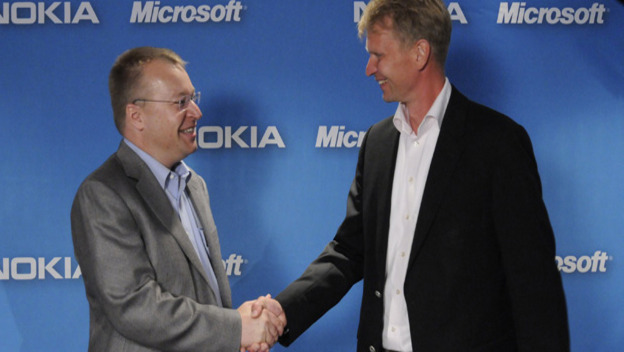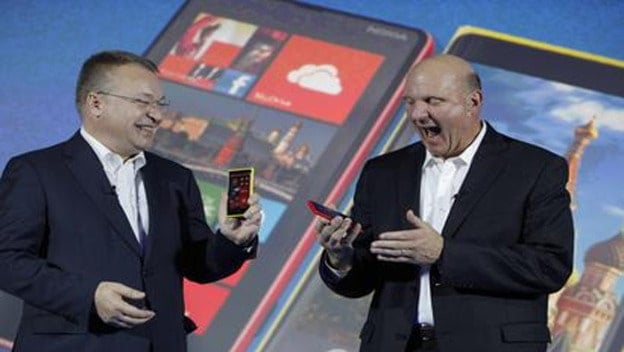As reported by several sources , Microsoft today announced its acquisition of Nokia’s products (devices and services) and patents. The two deals were struck for $5 billion and $2.17 billion respectively, leaving the final price tag at a lofty $7.2 billion. The purchase also brought the news that the acquired manufacturing force will assimilate Microsoft’s own Devices and Studios divisions and, as soon-to-retire Microsoft CEO Steve Ballmer stated, integrate “most of the teams coming over from Nokia.” The teams in question are the 32,000 Nokia employees who will soon be working under the Microsoft banner.
Commenting on the purchase, Nokia CEO and President Stephen Elop—who will soon begin work as executive vice president, overseeing Microsoft’s collective Devices and Studios— said the following : “Building on our successful partnership, we can now bring together the best of Microsoft’s software engineering with the best of Nokia’s product engineering, award-winning design, and global sales, marketing and manufacturing.”
Clearly, the purchase is a massive boon for MS. As a prominent tablet and phone manufacturer, Nokia aligns with Microsoft’s increasingly interconnected hardware line perfectly and will only extend the corporation’s reach. The buyout indicates that Microsoft is planning to broaden its influence in the smartphone and tablet market, using Nokia as its flagship resource. Microsoft’s surface-tablet line, in particular, stands to benefit from the expansion. Similarly, the $7 billion agreement may prove beneficial for the Xbox One, which, as MS has so ardently demonstrated , is heavily geared towards more than just gaming.
More than just a gaming company, Microsoft holds sway in a myriad of hardware and software industries. Deep pockets aside, however, a core strength of MS is, and has been, shared content and support between devices. In addition to time-devouring tablets and smartphones, we’ve seen this through the Xbox One’s approach to the next console generation, which, while received in wildly varying ways, has remained unwaveringly focused on adding features heretofore unknown to home consoles. From streaming and sharing to social and multimedia, Microsoft is banking on more than Halo this time around.
And they’re not the only ones. In fact, every developer under the sun is clamoring for “improved accessibility,” a goal often achieved through mobile avenues. Developers DICE and Ubisoft, for example, have added tablet support to Battlefield 4 and Watch_Dogs , and, surprisingly, have done so in a way that doesn’t detract from the core game. In lieu of the infinitely annoying mobile craze of shallow microtransactions and gimmicky features, BF4 and Watch_Dogs will feature “companion apps,” which add an external means of gaming to the mix in the form of Commander Management for the former and in-game hacking (i.e., messing with players’ worlds) for the latter.
However, Microsoft’s role in the interconnectivity arms race is uniquely significant, in no small part because it has an entire console under its belt. The Nokia purchase could mean any number of things for the Xbox One, from a dedicated companion device or app (which would help MS answer Sony’s next-gen Vita campaign) to increased Windows support for the system. What’s more, as VG24/7 reports , Robert W. Baird & Co. analyst Colin Sebastian has suggested that, rather than impacting the tablet and smartphone industry to any great extent, the purchase will allow Microsoft to “leverage the success of Xbox and the upcoming console upgrade cycle by combining hardware initiatives, and integrating content offerings across devices.”

Sebastian also noted that the “mobile operating system battle will shift quickly” from the realm of peripherals to home systems, likely through PCs and SmartTVs. The same can easily be said for gaming consoles. Moreover, that the XOne will be running “a Windows 8 engine” all but paves the way for just such a shift. In addition, the very structure of Microsoft’s Devices and Studios Engineering Group, one led by Julie Larson-Green, who describes the group as encompassing “all games, music, video and other entertainment,” is rife with opportunity for multiple devices.
The overarching (and currently unanswered) question is whether or not the Nokia purchase will spell improved mobile support for the Xbox One as well as how Microsoft will approach the possibility. While MS isn’t going to win a console race with tablets alone, making peripheral devices more affordable or accessible and then applying that support to its console’s palette could prove to be a sizeable advantage. Of course, the underlying factor there is whether or not gamers will warm up to the idea.
